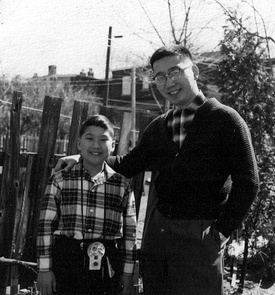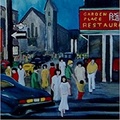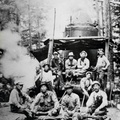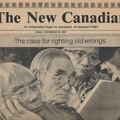Not much is known about David Toguri’s early life. He’s also not well-known in the Asian North American communities, especially in Canada, his birthplace—which is surprising since he is so famous in Europe. I suppose his anonymity is a testament to this talented yet humble artist.
I met David Toguri at a Japanese Canadian community banquet sometime in the late 1990s. Can’t remember what the occasion was, but I was impressed that he was a guest. He was in point of fact invited by a family member and not by the organizers. He was Nisei, tall and slight, and possessed a dancer’s body. Which makes perfect sense; he was an internationally well-known and celebrated choreographer. From 1960 on, he established his reputation in London’s West End theatre district by choreographing stellar and highly praised productions of Measure for Measure, The Blue Angel, The Rocky Horror Picture Show, and Pacific Overtures to name a few. He won many awards, including the Olivier Award for Best Choreography, for The Threepenny Opera, The Beggar’s Opera and Guys and Dolls.
He also choreographed films like Peter’s Friends (a personal favourite of mine starring a galaxy of famed British stars like Hugh Laurie, Stephen Fry, Kenneth Branagh, Imelda Staunton, and Emma Thompson), Who Framed Roger Rabbit?, Absolute Beginners (with David Bowie), and Give My Regards to Broad Street (starring Paul McCartney and Ringo Starr), again to name a few.
He also staged several music videos, most notably for Freddy Mercury (A Crazy Little Thing Called Love), David Bowie (Blue Jeans), and Tina Turner (Break Every Rule).
I first noticed him in the film version of Flower Drum Song. He was one of the key dancers. He’s front and centre with a close-up in the musical number Chop Suey. What a great smile and the moves were smooth!
He later appeared in the James Bond flick, You Only Live Twice. He plays a would-be assassin who crawls along the rafters of a bedroom and lowers a string to just above his sleeping victim’s lips. He then pours poison down the string until it drips into the mouth. The intended target was James Bond himself (Sean Connery), but the plot is foiled, of course.
Toguri also acted as Commander Yamada in the Danger Man (Secret Agent Man in the US) episode Koroshi. He was opposite Patrick McGoohan of The Prisoner fame. To my surprise, he played it straight, with no accent and was obviously competent in his job. He was also featured in such forgettable films as Rentadick, a spy/detective spoof made for British television in the 1960s. The only remarkable thing about that film was the fact that John Cleese and Graham Chapman (future mainstays of Monty Python) wrote it. It was so bad, both Cleese and Chapman fought to have their names removed from the credits. Even I, with my high tolerance for bad films, can’t bring myself to ordering it. But such is the fate of an Asian actor in the movies. You take what you can get.

David Toguri was born on October 25, 1933, in Vancouver, British Columbia. I couldn’t find much information about what happened to his family during WWII. I assume they were interned but I have no idea where. I suppose he was like most Nisei; he didn’t want to talk about it. He would have been nine or ten at the time of exile, the same age as my brother, Hideki, who was interned with our parents in a place called Minto.
After the war and after the restrictions were lifted, the Toguris moved to Toronto. I was told he lived close to my family. He went to Jarvis Collegiate where he met and pal’d around with my brother. Hideki became an avid fan of Flower Drum Song, maybe because of his friendship or maybe because it featured an all-Asian cast. I do remember finding photos (now lost) taken by my brother of a road production of the musical in some anonymous tent theatre at the Canadian National Exhibition [the CNE], an annual fair still staged today, in Toronto. David Toguri was one of the dancers. I wouldn’t be surprised if Robert Ito (another Japanese Canadian Nisei dancer and actor) was also in the company.
From there, he made his way west to become involved with film roles, dance parts mostly, but there was the odd role as an uncredited extra (the James Bond movie for example). He really flourished and became immersed in the theatre and musical theatre in London, England.
He made his West End debut when he came to England with Flower Drum Song in 1960 at the Palace Theatre. According to critics and theatre goers, he brought a muscular approach to dance contrasting greatly with the genteel style of British choreography at the time. His career was set when he made the fateful decision to stay.
As for the man himself, I had the impression that he was a self-effacing and humble man. Never called attention to himself, unless he was dancing, I assume, and never bragged about his enormous achievements. As I mentioned, he is virtually unknown in Canada and within the Japanese Canadian community. And that is a shame, because whenever I watch Flower Drum Song, I see the joy and love of dance within him. He is having a great time and he lets you know it.
I talked to him only once more, on the phone this time, again I don’t remember why, but little did I know how close to death he was. David Toguri died of cancer on November 15, 1997. I suppose that’s why he came back to Toronto – to be with family and to be with his own community.
© 2019 Terry Watada










